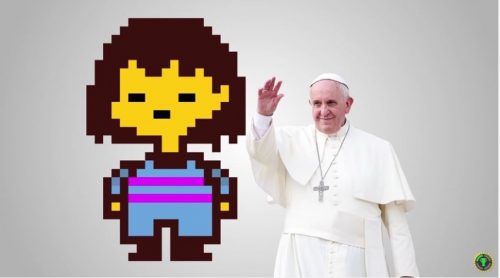
VATICAN CITY — Pope Francis got game — a role-playing, cult video game, that is.
Appropriately, the game is not a stereotypical virtual world of bloody combat by blasphemous brutes, but the critically acclaimed video game, Undertale, which lets players choose to dialogue with and feel mercy for “monsters” rather than attack and kill them.
U.S. gamer, Matthew Patrick, was one of a dozen YouTubers, who met with the pope in May as part of a world congress sponsored by Scholas Occurrentes. The highly popular vloggers, who have, when tallied together, about 25 million subscribers, were invited to meet and interview the pope.
Patrick, whose screen name is MatPat, revealed on his “The Game Theorists” YouTube channel July 5 that, during the papal encounter, he gave the pope an activation code to purchase and download Undertale because the popular release “speaks his language.”
“This year is his self-proclaimed Year of Mercy for the Catholic Church, a period celebrating forgiveness and compassion,” Patrick said in his video. “What’s the recurring theme throughout Undertale? Mercy,” he said, not only for the innocent, but even for “the most vile murderers.”
The 29-year-old self-described “information addict” gives an extensive explanation in his 16-minute video of why he chose to give the pope the game instead of, what he parodied as being, more distinctively American gifts like “an over-sized hamburger, a cowboy hat and a bald eagle carrying a machine gun.”
“If I was going to be the representative of any culture it was going to be of this culture, the Internet culture, and more specifically of gamers because our voice has so rarely gotten represented offline,” he said. Whenever the gaming world does make the news, he said, “it’s always, always, in the negative,” portraying gamers as killers or misogynists.
Giving the pope access to an online world that encourages solving problems peacefully was “an important symbolic gesture for all of us gamers,” he said. It was a way to counteract all the negative coverage gamers often get and “educate the world about the good works of gaming.”
The popularity of Undertale and its huge success in crowdfunding its development, he said, show how many people are looking for role-playing games where no one has to get hurt and communication and mercy win.
Patrick explained that the award-winning game challenges the human tendencies to make biased generalizations about others and to strengthen one’s personal sense of belonging and identity by creating hateful divisions of “us versus them.”
Undertale begins like many games with the player controlling the protagonist who must explore and confront a world populated by monsters. However, Patrick said, each enemy has its own unique personality, with its own name, “hopes, fears, insecurities, existing beyond just a simple label of ‘monster.'”
By the end of the game, he said, if the player chose the easier actions of attack or kill, then “the one true monster” ends up being “you — at the end of a genocide-run, someone who didn’t take the time to understand, listen to, interact with and show mercy to a group of individuals.”
Patrick said in his video that he did not really expect the pope to redeem the code and download the game, not least because the pope “doesn’t even have a computer.”
The gift was meant to be “a symbolic gesture because I believe it’s my responsibility” also to educate “the non-gamers who are confused about what the video game community entails, who we are and what we stand for and there is no better game to showcase the good of who we are as a community than Undertale.”
At a time “when the rest of the world is talking about actively building walls to hide out other groups of people,” he said, “that is something we gamers should be proud of.”























